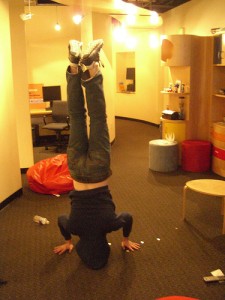If you're new here, you may want to subscribe to my RSS feed. Thanks for visiting!
A coupe of posts caught my eye this week talking about education. They were both inspired by a post by Leo Babauta of Zen Habits in which he advocates turning education on its head. Lisa at Craving Balance thinks about her son and decides that education will ruin him – if not now, then later. Aidan at Ivy League Insecurities is more positive about education – or at least hers even though she has veered off the corporate track. As for me, I have been unsatisfied with public education since our first son attended school in the 80’s. It is designed for the ‘ follow the dots’ child and has no tolerance for others. My older son did just enough to get through high school, hating every minute, and refused college. My younger had great fun and wasn’t expected to do anything more. It’s an outdated model we cling to and it handicaps our teachers and does great damage to out youth by letting them stay immature mentally much too long.
I have just read A Thomas Jefferson Education: Teaching a Generation of Leaders for the Twenty-first Century. I was blown away with the insight that had eluded me about what is wrong about education today. Oliver DeMille identifies the myth that prevents any solution of the education ‘problem’. This myth is that it is possible for one human being to educate another. He goes on to say that “Teaching, not education, should be our focus because great teaching inspires students to educate themselves. We are great believers these days in passive living. Let the system educate our kids. Let the system decide what health care we need or deserve. Let the government take care of us. Another of his points is that education is geared to training professionals but does nothing to train leaders and we suffer mightily from this failure. He suggests that we look at the kind of education that the early leaders of our country – Thomas Jefferson is a prime example- received. He asks what teaching allowed them to be the thinkers and writers that so influenced the founding of our country. Simply put Mr. DeMille identifies four phases of education. The core phase (ages 0-8) focuses on a foundation of right and wrong, good and bad with little imphasis on early acquisition of reading and writing skills, letting them develop according to the inclination of the individual. The second phase is Love of Learning (8-12) in which the child develops basic levels of understanding of the vaious fields of study as well as continuing to develop his understanding of identity and community. The next phase is the Scholar Phase (12-16) where the student learns to assume more and more responsibility for learning. The final phase is the Depth Phase (16-22) where the hunger for leaning is nurtured by a relationship with a mentor to guide this growth.
Now I wish I could go back and get involved with my sons’ education, perhaps even homeschooling. How can a responsible thinking person risk the future of their children to public education? I guess by sleepwalking just like I did. There is a better way, but it’s not easy- like sending your kids to public school- it requires you to take charge.


I’ve always thought the Montessori school sounds interesting and more in tune with development than the “connect the dots” type education you’ve described here. Kids are tested within an inch of their lives now and have no room for play or nature. Makes me sad, and I went through school not so long ago.
They had Montessori schools when I was a kid. Don’t know what they do but I’m suspicious. I lean toward home schooling- now that it’s too late to do anything about it.
Isn’t that they way life is though. Always taking the test before we learn the lesson!
Ralph, thanks for the wink and the link!
My son went to a Waldorf school until 4th grade, then public school for 5th and 6th. Now he’s in 7th. I was at one point the enrollment director for this school, so I can say first hand that Waldorf (and Montessori too) gives children everything they need to become life long lovers of learning. They do not teach to the test. Both disciplines teach children HOW to learn through deep story and age appropriate story telling and the age-old practice of socratic inquiry (open ended questions, what ifs, etc.). It’s as relevant and effective in English as it is in Science because it’s founded on curiosity and engagement.
I can also say first hand that NONE of this is happening in public education. We are so afraid of failing and not measuring up that we keep piling on more and more irrelevant BS, and kids have no time to contemplate the fuzz in their navels (which is of course where everyone comes up with their best theories and discoveries).
My job now is to stay vigilant. Ask questions like: how is this important? What things in life might this be useful for? What would happen if…? Where have you seen this work? What do you think is missing? How would you do it differently? Care to try that and see what happens?
I also give my son permission to fail. I tell him to turn in the paper as is to see what you did well and what you didn’t do well. Your next grade will be better. I don’t correct his homework, I ask questions…
I could go on forever…
Being engaged is what is important. And not letting it get to the point where your son sees you as an agent of the school agenda which is what I fear I became. Now that he is talking to us again (at age 30) maybe sometime I can ask.